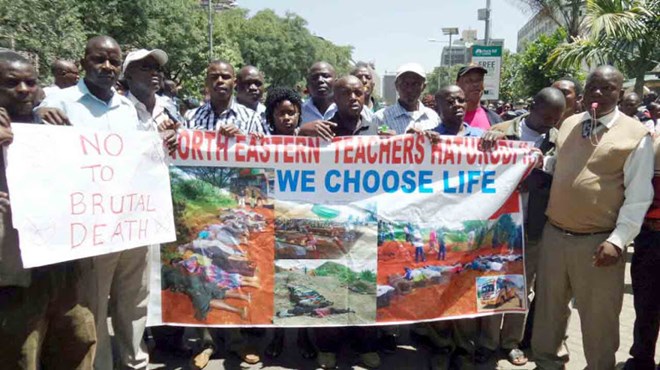
Wednesday September 30, 2020

A task force appointed by Education CS George Magoha has proposed phased reopening of schools, which were closed following the Covid-19 pandemic.
In Northern Kenya schools were closed a month before Covid-19 was reported in the country. More than 2,340 out of almost 4,000 non-local primary and secondary school teachers have left Mandera, Wajir and Garissa, leaving only about 2,000 local teachers.
Al Shabaab has tried to trigger a ‘religious war’ between Muslims and Christians to get even with the Kenyan government, which it accuses of sending ‘occupational forces’ into Somalia to fight them.
Residents are not to blame for the failure of intelligence, corruption allegations and the fact that the security apparatus are all led by non-Somalis.
The reliance on non-local teachers is due to systemic failure by successive regimes, which have marginalised the NEP since 1962. No efforts have been made to build the capacity of the Northerners, to have local teachers trained and employed as a possible solution.
Reopening schools will be doubly challenging in Northern Kenya with already stretched infrastructure.
Magoha’s team proposes the provision of clean running water and handwash; placing hand-washing facilities, sanitiser and disinfectants in strategic places; face masks for each learner and thermo guns.
Implementing the MoH guidelines in an already resource-stretched region will be difficult. Most schools have no stable source of water. Few have underground tanks, relying on water bowsers, which sell the commodity at exorbitant prices. Others have no fences to control movement, classrooms have more than 50 learners and dormitories are overcrowded.
The pupil to teacher ratio in public primary schools is 70:1 against the recommended PTR in Kenya of 40:1. In public secondary schools the student-teacher ratio stands at 100.1. In Ghana it’s 30:1, South Africa is 33:1, Japan stands at 16:1 Finland is 13.1.
We cannot possibly control the spread of Covid-19 among children. They assemble outside their homes and leave for school in groups. By the time they get to school, they would probably already be infected and there is not much teachers can do at that point.
Rural parents are already scared of Covid-19 and on their knees financially. They had been working with an earlier communication that schools would reopen in January 2021. The Teachers Service Commission, meanwhile, has refused to post tutors to Northeastern.
Some quarters argue the Somali community must be the first line of defence for the non-local teachers in their midst. That said, dismissing the needs of an entire generation from the comfort of air-conditioned offices in Nairobi is not only selfish but also unreasonable.
Most learners in NEP rely on boarding schools and with drought ravaging the pastoralists, many might not be able to attend class as animal prices drop and families migrate to Somalia and Ethiopia in search water and pasture.